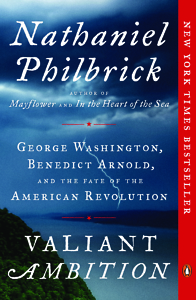Benedict Arnold was one of America’s great soldiers, a man whose tactical ability and bravery won battles against Great Britain, and yet General Nathanael Greene called him “Once his country’s idol, now her horror.” As every American schoolchild knows, Arnold’s name is synonymous with “traitor” and still inspires loathing in the country he betrayed more than 235 years ago. Why did he do it? This is the question Nathaniel Philbrick explores in his latest book, Valiant Ambition: George Washington, Benedict Arnold, and the Fate of the American Revolution. Philbrick’s retelling of this familiar story is a grand adventure into the darkness of the human heart.

In Valiant Ambition, Philbrick—winner of the National Book Award (for In the Heart of the Sea) and a finalist for the Pulitzer Prize (for Mayflower)—brings his immense talent to the American Revolution and its great personalities. Of all the military leaders of the war, two of the greatest were General George Washington, commander in chief of the Continental Army, and Major General Benedict Arnold. Although they were very different men, Washington and Arnold were both considered indispensable to the Revolution.
Washington’s equanimity and unwavering honor kept the army together when, by all rights, it should have disintegrated. Arnold was no Washington, but he didn’t have to be: “Arnold might be vain, overly sensitive to slight, and difficult to work with, but there were few officers in either the American or British army who possessed his talent for almost instantly assessing the strengths and weaknesses of the enemy,” writes Philbrick. Arnold gave the new country victories against the most powerful military force in the world, buying time and, with his crucial role in the win at Saratoga, helping to secure the all-important alliance with France.
But, as Philbrick notes with understatement, “Arnold had a talent for rubbing people the wrong way,” a trait that came to haunt him. He was unfairly passed over for promotion by a Congress so dysfunctional that it makes today’s political stalemate seem positively quaint. His superior at Saratoga tried to take credit for Arnold’s success. Fellow officers smeared him. All the while, Washington begged him not to resign. The commander in chief succeeded, only to have stronger passions propel Arnold into the arms of the enemy.
 The American Revolution brought a heavy dose of social upheaval. In Philadelphia, where Arnold served as military governor while recuperating from wounds suffered in battle, conspiracy was rife and violence all too common. “In this increasingly toxic and potentially explosive environment,” writes Philbrick, “issues of class threatened to transform a revolution that had once inspired a collective quest for national independence into a sordid and ultimately self-defeating civil war.” Arnold, abrasive and arrogant, walked right into a political conflict that resulted in criminal accusations—largely unfounded—against him.
The American Revolution brought a heavy dose of social upheaval. In Philadelphia, where Arnold served as military governor while recuperating from wounds suffered in battle, conspiracy was rife and violence all too common. “In this increasingly toxic and potentially explosive environment,” writes Philbrick, “issues of class threatened to transform a revolution that had once inspired a collective quest for national independence into a sordid and ultimately self-defeating civil war.” Arnold, abrasive and arrogant, walked right into a political conflict that resulted in criminal accusations—largely unfounded—against him.
And there was a woman: “She was seventeen and beautiful,” Philbrick writes. Peggy Shippen was a Philadelphia heiress whose family had loyalist leanings. Her brother served in the British army; her father had served the Crown as a judge. Once married to Arnold, she set to convincing him that he should consider serving people who truly appreciated his talents.
Ultimately, the combination of insults, accusations, money woes, and love proved far stronger than Washington’s entreaties or the desire to forge a new nation. Arnold made contact with the British, conspired to surrender West Point, and was finally undone in a series of events that, as told by a skilled writer like Philbrick, rival the best spy novels. Although he served out the war as a brigadier general in the British army, Arnold never achieved the greatness he so eagerly sought. His crimes made him suspect on both sides: “Unmoored from his past and without, as yet, a future, Arnold was now the loneliest man on God’s earth.”
Ironically, his betrayal helped the American cause. The young nation, shocked by what a hero had done, realized that it was not too late to pull together rather than split apart: “By turning traitor, Arnold had alerted the American people to how close they had all come to betraying the Revolution by putting their own interests ahead of their newborn country’s.”

A Michigan native, Chris Scott is an unrepentant Yankee who arrived in Nashville more than twenty-five years ago and has gradually adapted to Southern ways. He is a geologist by profession and an historian by avocation.
Tagged: Nonfiction





